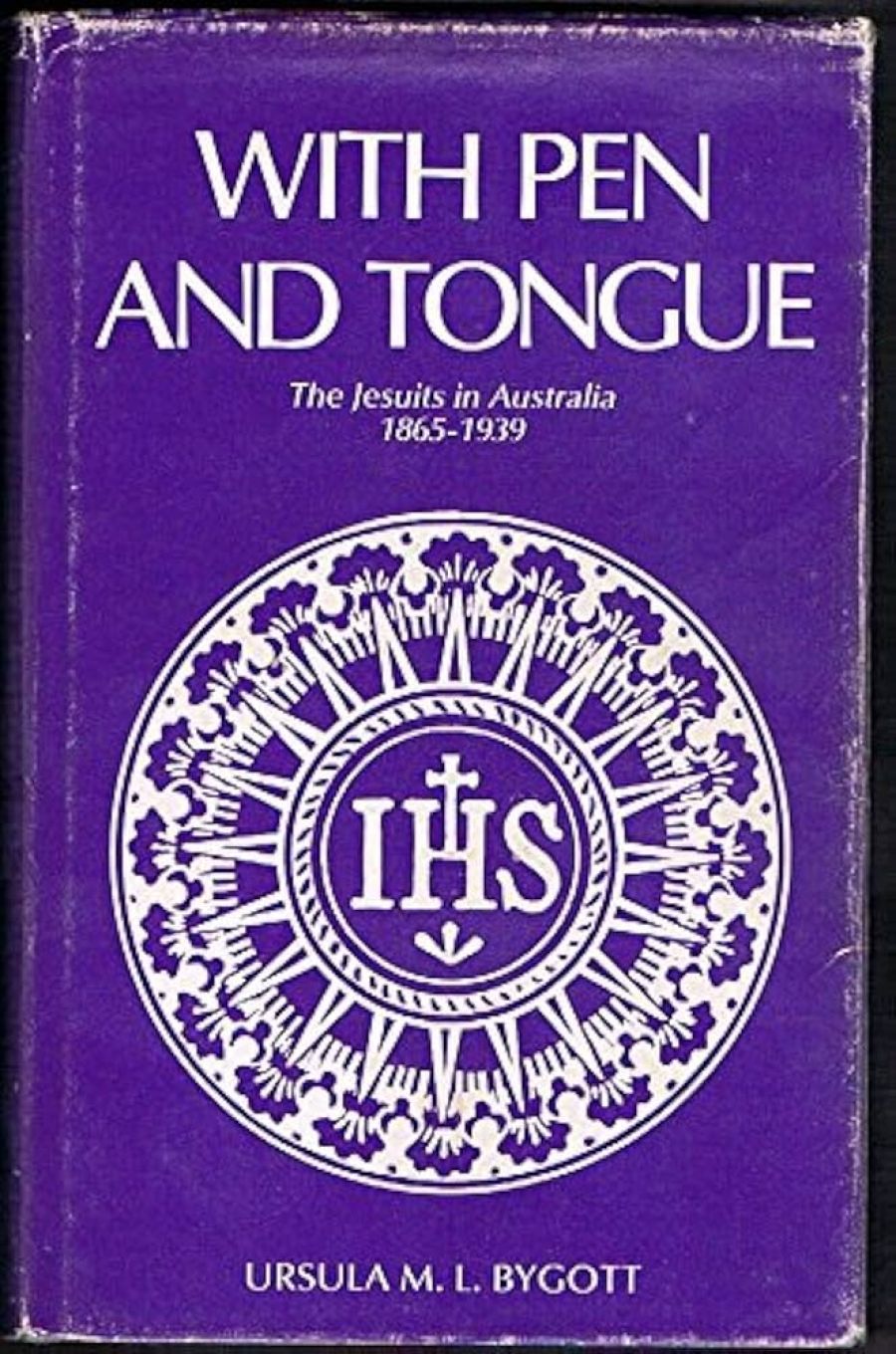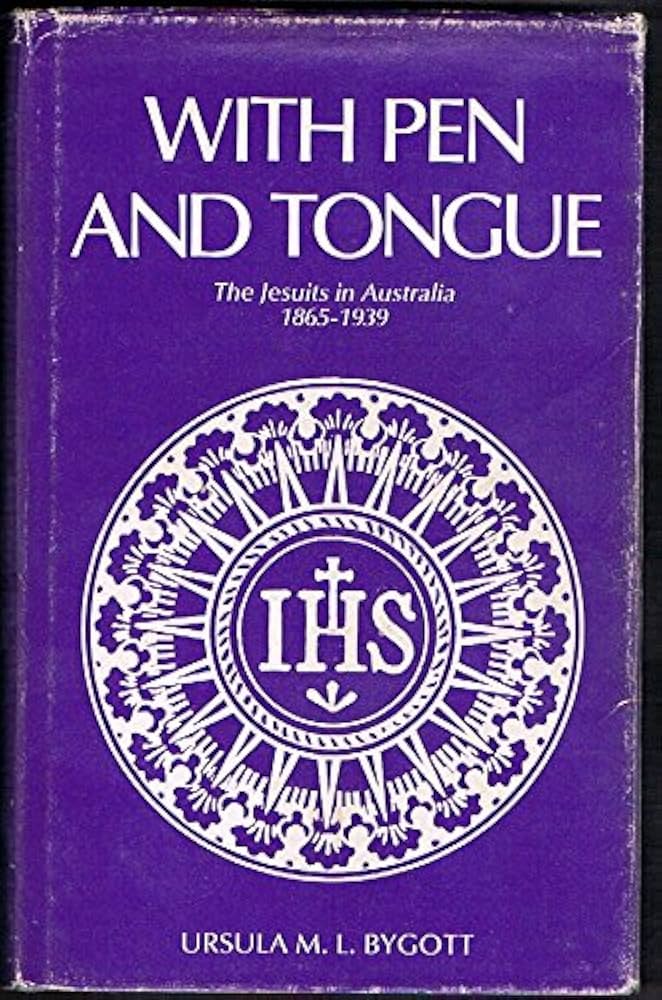
- Free Article: No
- Contents Category: Religion
- Review Article: Yes
- Article Title: Resistance and Assimilation
- Online Only: No
- Custom Highlight Text:
The Jesuits are, whatever else you might say about them, formidable. Dr Bygott quotes Francis Bacon, who believed that the Jesuits as teachers ‘are so good that I wish they were on our side’.
- Book 1 Title: With Pen and Tongue
- Book 1 Subtitle: The Jesuits in Australia 1865-1939
- Book 1 Biblio: Melbourne University Press, $27.00 pb, 423 pp
- Book 1 Cover Small (400 x 600):

- Book 1 Cover (800 x 1200):

The magnitude of their significance is attested by two interesting historical phenomena: (i) they must surely be the most oft-suppressed Catholic society in history; and (ii) their very name has, at times, been used as a synonym for ‘liar’ and their philosophy unjustly caricatured as casuistry, promoting the principle that the end justifies the means.
None of this is, in fact, true. I have never known the Jesuits to be equivocal, slippery characters. You might not like what they were saying, but by God you knew what it was they were saying. Otherwise they would be scarcely worth suppressing.
On the other hand, as Dr Bygott charmingly observes, ‘the Jesuits were not given to making public pronouncements in fields in which they were not conversant.’ (Surely, in Australian Catholicity, a rare virtue in itself.)
In general, they are bright men, in more ways than one. Not for them the hell-fire or the spiritual blitzkrieg. What Dr Bygott says of Albert Power could be equally applied to most of the Society: he ‘preached a practical Christianity ... He was essentially an optimist in both spiritual and material matters. He ‘never preached gloom; on the contrary insisted on trust ... cheerfulness, and encouragement.’ One of my favourite stories, not included in this book, concerns Kenneth McKillop. When he was dying, he called for a nurse to bring him the towel. She asked him what he wanted it for. ‘I want to chuck it in’, he said, and did.
As Dr Bygott makes clear, the Jesuits have been careful men. They had to be. As educationalists, eventually called upon to conduct not only prominent schools and colleges, but the provincial seminary of Victoria and the highly influential Newman College at Melbourne University, they were the intellectual leaven of an Australian Catholicity which was often divided on major issues – imperialism, Sinn Feinism, various wars. Socialism, Fascism, Spain, Mexico, Abyssinia. ‘The Jesuits trod warily in their relations with both the hierarchy and the government.’
But although they were ‘conservative in their social, religious, and political allegiances’, they were not mindlessly conformist. They were early champions of the role of conscience, and were quite fearless when their own consciences dictated that the boat had to be rocked. They were of vital importance in fostering that spirit of enquiry that was to be a distinctive mark of the Catholic intellectual movement in Victoria. Their approach is summed up in the words of the distinguished Jeremiah Murphy, S.J.: The Church ‘alternates not between resistance and passivity, but between resistance and most active process of adaptation and assimilation ... New conditions arise – she studies them – new secular truths arc unearthed – she makes them her own. New methods from without she welcomes.’ (My own comment here would be that Murphy’s statement would be much closer to accuracy if he had limited its subject to his own Society: its truth diminishes in proportion to its application to *the Church’ at large.)
Their stance on social justice was vigorous, even fierce. Here is Martindale: ‘That masses of men should not have enough to eat or be disgustingly housed, while others possess huge fortunes, is sinful. It is a coagulated injustice, a social and collective sin ... not just sad, but sinful. Now where there is sin, there is responsibility ... A few determined individuals can alter the current of public opinion and thereby the structure of society – no revolution has ever been carried out through a majority, but by a handful of determined men, especially when the majority was apathetic.’
Dr Bygott’s study is not limited to the achievements of the Jesuits themselves. Much is made of the many outstanding laymen who came within their educational influence. But if the Jesuits in Australia had one major failure, it was in the matter referred to at the end of the chapter on Newman College: ‘Were the Jesuits to be equally successful in producing ... academically sound (diocesan) clergy? Mannix believed they would.’ I believe they did not. For every D’Arcy, Duffy, or Moloney, the name of the tunnel-visioned is legion. A glance at this book’s index suggests that the clergy have not been found worth citing.


Comments powered by CComment